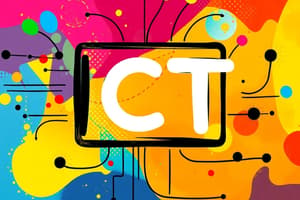Podcast
Questions and Answers
Which type of cloud is exclusively utilized by a single organization?
Which type of cloud is exclusively utilized by a single organization?
- Community cloud
- Hybrid cloud
- Enterprise cloud (correct)
- Public cloud
What is a key characteristic of a local area network (LAN)?
What is a key characteristic of a local area network (LAN)?
- It connects computers over global distances.
- It is limited to a specific geographic area. (correct)
- It requires internet connectivity to function.
- It typically operates on a wireless connection only.
Which of the following best defines application software?
Which of the following best defines application software?
- Software aimed at performing specific user-related tasks. (correct)
- Software that manages computer hardware and system resources.
- Software that executes background processes without user interaction.
- Software specifically designed for administrative tasks.
Which of the following skills is NOT considered a key component of digital literacy?
Which of the following skills is NOT considered a key component of digital literacy?
What is the primary role of system software?
What is the primary role of system software?
Which component of ICT emphasizes the importance of people and procedures in transforming data into actionable knowledge?
Which component of ICT emphasizes the importance of people and procedures in transforming data into actionable knowledge?
What is the primary function of a database in the context of ICT?
What is the primary function of a database in the context of ICT?
In the realm of cloud computing, what is the significance of edge servers?
In the realm of cloud computing, what is the significance of edge servers?
Which of the following best describes ICT literacy?
Which of the following best describes ICT literacy?
What distinguishes a data warehouse from a regular database in information systems?
What distinguishes a data warehouse from a regular database in information systems?
Flashcards
Technology
Technology
Processes and products utilizing knowledge, from simple tools to advanced devices.
ICT Literacy
ICT Literacy
Using digital tools to access, manage, and evaluate information.
Human Resources (in ICT)
Human Resources (in ICT)
People operating and managing knowledge systems within ICT.
Database and Data Warehouse
Database and Data Warehouse
Signup and view all the flashcards
Cloud Computing
Cloud Computing
Signup and view all the flashcards
Telecommunications
Telecommunications
Signup and view all the flashcards
Software
Software
Signup and view all the flashcards
Hardware
Hardware
Signup and view all the flashcards
Educational Technology
Educational Technology
Signup and view all the flashcards
Digital Literacy
Digital Literacy
Signup and view all the flashcards
Study Notes
Technology and ICT Literacy
- Technology encompasses processes and products that utilize knowledge, ranging from basic tools like pencil and paper to advanced electronic devices.
- ICT Literacy involves using digital technology and communication tools to access, manage, and evaluate information in a knowledge-driven society.
- ICT includes various communication devices, including radio, television, mobile phones, and computers, along with services like video conferencing and distance learning.
Components of ICT
-
Human Resources
- Central to ICT systems; involves the people who operate and manage knowledge systems, aiding in learning and decision-making based on data analysis.
-
Database and Data Warehouse
- Databases store data that can be queried using specific criteria; data warehouses aggregate diverse data for organizational needs.
- The relevance of databases has increased with big data, which handles vast amounts of information for analysis.
-
Cloud Computing
- Refers to internet-based data centers accessible to multiple users, with functions distributed across various locations.
- Types of clouds: enterprise (private), public (available to all), and hybrid (a mix of both).
- Amazon AWS is recognized as the largest public cloud service.
-
Telecommunications
- Establishes network connections through wired (Ethernet, fiber optics) or wireless (Wi-Fi) means.
- Networks can be local (LAN) for small areas like offices or expansive (WAN) covering broader regions, exemplified by the internet.
-
Software
- Essential for hardware operation, categorized into system software (e.g., Windows, iOS) and application software (e.g., Microsoft Office).
- System software manages hardware, while application software serves specific user tasks like document creation and video editing.
-
Hardware
- Physical components of technology, consisting of devices from compact smartphones to large supercomputers.
- Includes peripherals like keyboards and routers, alongside a growing trend of interconnected devices in everyday environments.
Educational Technology and Digital Literacy
-
Educational Technology
- Encompasses all technological tools used in teaching, including both non-digital (e.g., flip charts) and digital tools (e.g., software).
-
Digital Literacy
- The capability to find, evaluate, and create content using information technologies and the Internet, incorporating both cognitive and technical skills.
- Essential skills for digital literacy involve critical thinking, effective communication, collaboration, creativity, and online safety.
Critical Thinking in Digital Literacy
- Involves analyzing and synthesizing online information to differentiate between credible sources and misinformation.
- Critical thinking enhances individuals' ability to navigate the digital landscape thoughtfully and informedly.
Studying That Suits You
Use AI to generate personalized quizzes and flashcards to suit your learning preferences.




